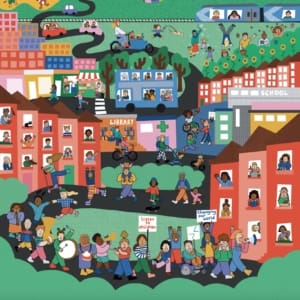Our history


-
Early days: 1993 – 2012
Formed in 1983 as a small network of voluntary children’s organisations, the Scottish Child and Family Alliance (SCAFA) was an early iteration of the organisation into which Children in Scotland would evolve.
Seconded to SCAFA from the University of Edinburgh in 1990 as CEO, Dr Bronwen Cohen led negotiations to widen its membership base across the whole children’s sector.
‘All things seem possible’
The organisation was relaunched as Children in Scotland in 1993, its new name reflecting an enduring commitment to universalism: every child, every childhood.
Its extended membership across voluntary, professional and statutory organisations offered a powerful means of leading discourse and influencing relevant legislation.
The organisation cut its teeth in bringing together members with politicians to inform and improve what became the Children (Scotland) Act in 1995 as it passed through Westminster. Scotland’s new children’s legislation had come six years after similar legislation in England and Wales, a delay that highlighted the need for its own parliament.
After 1997 the prospect of a Scottish Parliament moved closer to reality, creating an atmosphere in which ‘all things seemed possible’. Children’s issues featured prominently in debate, with growing support for a Minister for Children and a Children’s Commissioner, much talk of ‘joined-up’ working, New Community Schools and a National Debate on Education.
Once upon a time in Holyrood
Children in Scotland, in partnership with the then Scottish Council Foundation, published Children, Families and Learning, offering a new agenda for education through suggesting a review of when, where and how children learn.
From 1999, the newly established Scottish Parliament became the primary focus. This included advocating for children’s rights and better provision for additional support for learning, leading in 1999 to the ASL advice and support service, Enquire, and, in 2004, the mediation service Resolve.
The case was made successfully for all children to have the right to school education, a provision included within the Standards in Scotland’s Schools Act 2000, paving the way for subsequent ASL legislation.
Stronger in Europe
From the outset, Children in Scotland became known for its EU and international partnerships and research. The CEO’s role as the UK representative on the European Commission’s Childcare Network brought it into the heart of EU research and policy discussions on early years.
An array of publications, including Children in Europe magazine (published in some 15 languages), study visits and conferences, research and projects, and partnership with architects, educators and the OECD in the international Making Space architecture and designs awards, encouraged awareness of policies and practice in other countries and shared Scottish practice on a broader stage.
Over Bronwen Cohen’s tenure, Children in Scotland grew rapidly, increasing its membership, expanding its policy and research department, and adding an admired training arm and communications team. Its analysis and new thinking on child policy and childhoods, and how children themselves can inform this process, earned it an international reputation.
-
An equal chance to flourish: 2012 – 2021
In summer 2012 Bronwen Cohen was succeeded by Jackie Brock, who drew on her experiences in developing Curriculum for Excellence at the Scottish Government and work across children’s services, including in additional support for learning, wellbeing, foster, kinship and residential care, youth justice and child protection inspections.
Jackie focused on re-engaging and broadening the Children in Scotland membership and with members, identifying as early priorities efforts to tackle child poverty, improve attainment, and reshape childcare so that it became more affordable and flexible.
Local heroes
During this period the organisation benefited from developing ‘on the ground’ initiatives to test out policy at local level and gather persuasive evidence.
Food, Families Futures (2015-2020) was a partnership programme aimed at addressing food insecurity and its links with wellbeing and education. Starting with holiday clubs providing meals and fun activities at two primaries in Glasgow, it spread to local authorities across Scotland, ultimately contributing to policy change at national level.
Similarly, Childcare and Nurture Glasgow East (CHANGE, 2016-2020) worked to create improved childcare for communities in the East of Glasgow and share local experiences and innovation. CHANGE called for local services that provide childcare or play for children and young people to be recognised as intrinsic to their communities, and to have ongoing, secure funding.
Both projects demonstrated what could happen if power was placed in the hands of decision-makers in local communities – and the extent to which our journey towards ‘maximum devolution’ is incomplete.
Vision and values
Reflecting an energetic, confident and committed staff team, 2017 saw the organisation launching its new brand identity, building on this the following year with 25 Calls, a campaign marking Children in Scotland’s quarter century. Both initiatives sought to foreground the organisation’s values and beliefs, and its big picture vision about how societal change could benefit children.
Partnership projects grew in variety and radicalism, ranging from the Commission for Childcare Reform and Childcare Alliance (2014-15 to Being Bold: Building Budgets for Children’s Wellbeing (2021), which called for finances to be redirected to tackle root causes of inequality as Scotland emerged from the Covid-19 pandemic.
New services including Reach and My Rights, My Say, responding to further developments in additional support for learning legislation and an improved understanding of young people’s rights, were launched, while the charity was strengthened through formal partnerships with Parenting across Scotland and the National Parenting Forum Scotland.
Opportunities were strengthened for members to exert an influence at all policymaking levels. This included the creation of the Children’s Sector Strategic Forum, where Ministers, CoSLA leadership and senior civil servants met with member representatives to discuss and decide action on key developments such as the Child Poverty Delivery Plan.
Brave new world
But perhaps the biggest shift over this period was in the charity’s championing of children and young people’s rights and participation. In parallel, partnership work saw strides made towards UNCRC incorporation and a more sincere approach to the involvement of children in Scottish Government-funded projects emerge.
New guidelines about the principles of participation and engagement were launched. Young people were appointed to the Board for the first time. Most significantly, in 2017 a children and young people’s advisory group, Changing our World, was convened, quickly becoming an integral force in the charity’s decision-making and its ability to channel authentic voices and lived experience.
As Jackie said in her farewell interview: “For me the biggest change has been the cultural shift to now include children and young people as equal partners and decision-makers in their own future.
“I’m incredibly proud of the record the organisation has in engaging children and young people in everything we do … Years ago, this approach would have been seen to be radical. Direct engagement with young people wasn’t common, and if it was, it was very tokenistic … things have changed dramatically, and Children in Scotland has absolutely been at the forefront of this.”
-
Into the future: 2021 – Present
Children in Scotland has been supported by a dedicated Board of Trustees since its inception. Welcoming the appointment of new CEO Jude Turbyne in June 2021, its then-Convener, Maureen McGinn CBE, said she would bring “experience, clear vision and commitment to social justice”.
Levelling up
With a background in international development, Jude introduced a fresh perspective to the organisation and sector. Taking up the post as the charity navigated the pandemic and as the cost-of-living crisis pressurised thousands of Scottish families, Children in Scotland drew on its convening power and partnerships to articulate how young people could best be supported.
Equality became a more powerful feature of continuing development and improvement. In 2018, with support from LGBT Youth Scotland, the charity had achieved the Silver Award of the LGBT Charter of Rights. Building on this, and in the aftermath of George Floyd’s murder and the growth of the Black Lives Matters movement, a more robust approach to race equality emerged, with publication of a pledge and the introduction of targets for tracking progress in representation and awareness.
Missions and manifestos
Core policy work and projects have been central to Children in Scotland’s impact since 1993. Through 2020 policy and comms staff drew on evidence from project and participation work and collaboration with partners to produce a well-received Manifesto for the 2021-26 Scottish Parliament. Its calls included extending the scope of Citizens’ Assemblies to channel the voice of under-16s; introducing a ‘hobby premium’ to ensure young people have free access to an activity of their choice within or around the school day; and improving air quality where children live, learn and play.
The Manifesto has since underpinned policy and influencing work, with a focus on inclusion of young people with additional support needs, structural and cultural reform of Scotland’s education system, improved access to arts and heritage experiences, and advances in participation.
Change points
Having provided in-person professional development to strengthen the skills of the children’s sector workforce for 27 years, the learning and events team abruptly shifted their programme online as Covid took hold. Webinars immediately made training more accessible but a return to the conversations and relationship-building central to in-person events remained out of reach for more than two years. Staff were therefore delighted to welcome more than 400 delegates back to annual conference in November 2022. It was a chance to reconnect with colleagues, reflect on the Covid experience and begin to reimagine projects and services.
Roads and renewal
Covid also entailed relocation. Having started life in slightly murky rooms in Edinburgh’s west end (1993-2014) before transferring to Rosebery House at Haymarket (2014-2020), the charity now operates from a new home in Rose Street.
Early in 2023, Children in Scotland published its strategic plan for the next five years. With its commitments to acting on children’s views, influencing policymakers to deliver on its Manifesto and maintaining a vibrant membership, it signalled the charity’s consistency of purpose over three decades – and its ability to renew.
As Jude said in her keynote at the 2022 annual conference, the constants remain a belief in the benefits of collaboration and what Children in Scotland can do to change lives:
“Collaboration is not always easy. Sometimes I think the work that is needed for good collaboration is underestimated. Organisations work in different ways, have different cultures, slightly different visions and missions. That is even more accentuated sometimes when you move from sector to sector. But the moment we construct a ‘them’ and ‘us’ model of action, the more we lose the power of the collective. Instead, we have to seek allies everywhere.
“If we are to make transformation happen, we have to be brave. We have to have the difficult conversations and be constructively challenging when necessary. And we have to build relationships within and beyond our own sectors and our traditional allies. It is a national project, and we need to work nationally to ensure long-lasting, transformative change.”
Children in Scotland’s 30th Anniversary Publication
In 2023 Children in Scotland celebrated 30 years of giving children across the country an equal chance to flourish. Read more about the work that shaped our first three decades in our anniversary publication.
